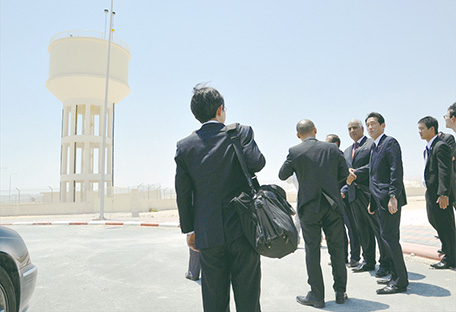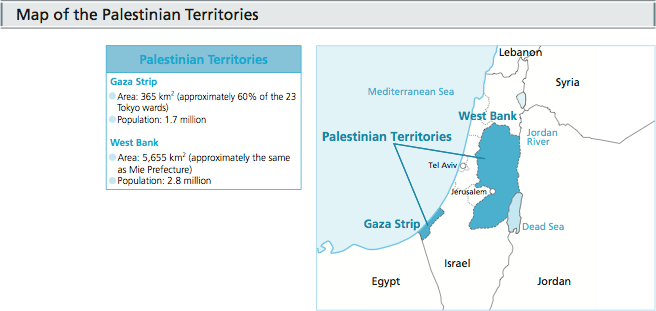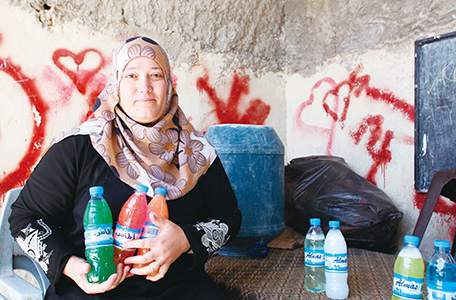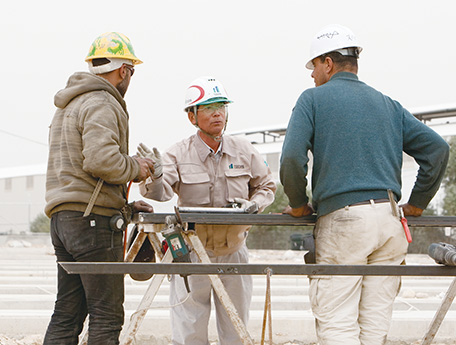Japan's Official Development Assistance White Paper 2013
(3) Palestine
The Palestine issue is at the core of the Arab-Israeli conflict that has continued for more than half a century. Middle East peace is an issue that has significant impact on the stability and prosperity of Japan and the rest of the world. Japan supports a two-state solution whereby Israel and a future independent Palestinian state live side by side in peace and security. To promote this, it is essential to prepare for nation-building through socio-economic development of Palestine, which is one of the parties of the peace process. Since the establishment of the Palestinian Interim Self-Government Authority based on the Oslo Accords in 1993, the international community including Japan has been proactively extending assistance to the Palestinians.
Although Palestinians continue to feel significant discontent and antipathy towards the Israeli occupation, many years of occupation have made them economically dependent on the Israeli economy as well as on aid from the international community. These circumstances make the achievement of Middle East peace even more difficult. Widening regional disparities and a high unemployment rate driven by Israel’s occupation policy and the sluggish economy are destabilizing factors in regional circumstances. Helping the Palestinian economy stand alone while improving living conditions for people is the most important challenge towards creating an environment where Palestinians can negotiate with Israelis for true peace.

Minister for Foreign Affairs Fumio Kishida visiting the Jericho Agro-Industrial Park (JAIP) in Palestine.
<Japan’s Efforts>
Peacebuilding is one of the priority issues in the ODA Charter, and Japan has positioned its assistance to the Palestinians as one of the important pillars of its measures to contribute to the Middle East peace process. In particular, Japan has provided $1.35 billion in total to the Palestinians since the 1993 Oslo Accords, third-highest behind the United States and the European Union (EU). Specifically, Japan provides various types of humanitarian aid through international organizations and NGOs to improve the tragic living conditions of the socially vulnerable people on the West Bank (including East Jerusalem) and people affected by conflict in the Gaza Strip, and others. Also, Japan proactively supports the Palestinian Authority to stabilize and improve its civil administration, enhance the administrative and financial capacity, and promote sustainable economic growth. These efforts aim for preparation for future Palestinian nation-building and a self-sustained Palestinian economy.

Further, since July 2006, Japan has advocated the initiative of the “Corridor for Peace and Prosperity”, as its unique mid- to long-term effort for future peaceful coexistence and co-prosperity between Israelis and Palestinians. The initiative aims to promote socio-economic development in the Jordan Valley area through the regional cooperation among the four parties of Japanese, Israelis, Palestinians and Jordanians. Currently, those four parties are working towards the establishment of an agro-industrial park in the suburbs of Jericho City in an effort to realize this initiative. The park aims to process agricultural products grown on the West Bank and distribute the products in and outside of the Palestinian territories and is expected to create around 7,000 jobs in the future.

A woman in a Palestinian refugee camp in Souf. She has received a training to make detergent through the Capacity Development for Improvement of Livelihood for Palestinian Refugees, and is now running a business to sell detergent. (Photo: Hironobu Kubota)
●Palestinian Territories
The Agro-Industrial Park in Jericho (JAIP)
In 2006, Japan launched the “Corridor for Peace and Prosperity” initiative under which Japan, the Palestinian Authority (PA), Israel and Jordan work together to facilitate economic and social development in the Jordan Valley to achieve co-existence and co-prosperity between the Israelis and the Palestinians. One of the central projects of this initiative is the development and management of the Agro-Industrial Park in Jericho (JAIP).
Historically the major industry of the Jordan Valley was agriculture; however, Israel’s occupation policy has restricted logistics within Palestinian territories. This has prohibited distribution of fresh produce to areas outside of Palestinian territories. Farmers in poverty have lost their means of earning income and are forced to live in a difficult situation. In order to solve these problems, the JAIP project is creating an agro-industrial park in the city of Jericho, where produce grown in the surrounding areas can be processed into products with a longer shelf-life.
Japan has developed infrastructure within JAIP, including roads, a solar power generation plant, water supply and sewerage systems, and administrative buildings. As part of the initiatives to improve the environment of JAIP, Japan also built Jericho’s first sewerage treatment facility. The plant is also benefiting neighboring Israel, with which underground water is shared. Therefore, the initiative also contributes to developing a relationship of trust between the Israelis and the Palestinians. Furthermore, through technical cooperation and collaboration with international organizations, Japan assists with the human resource development required for the sustainable management of JAIP. Japan’s efforts have been well received by Palestinian companies. Thus far, two companies have signed formal contracts to become tenants of the site, while an additional 32 companies have expressed interest (as of January 2014). Products produced within JAIP may be exported to the Gulf States via neighboring Jordan in addition to being sold in Palestinian territories. It is expected that the JAIP project will provide employment opportunities for 7,000 people, and up to as many as 20,000 to 30,000 people, including the families of those employees, will benefit from the project.
It is anticipated that the JAIP project will increase the independence of the Palestinian economy driven by Palestinian private sector development, and have a positive influence on the Middle East peace process going forward.

A lead member of the Japanese subcontractor at the site giving guidance to local workers (Photo: Shinichi Kuno / JICA)
